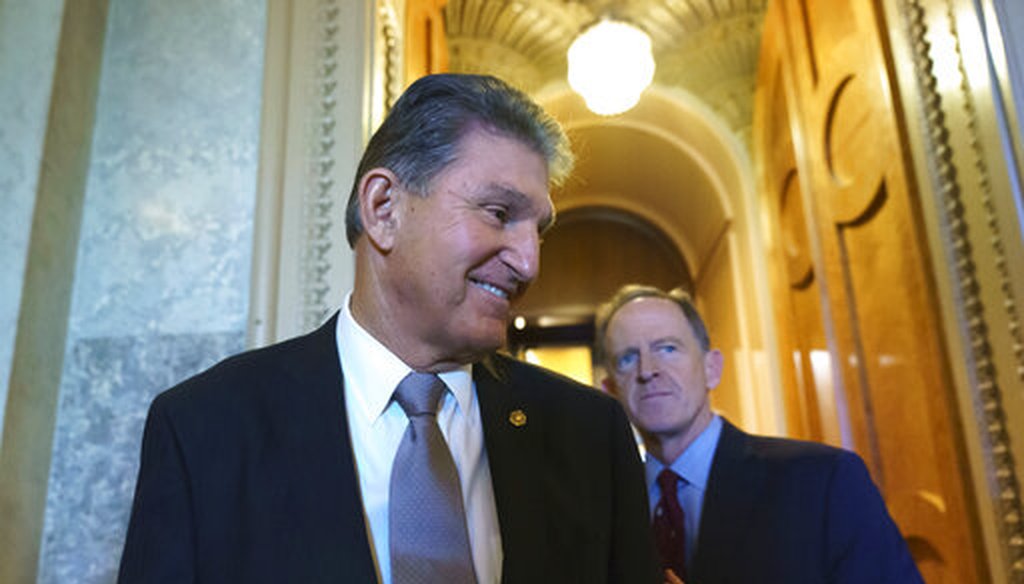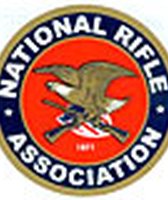Stand up for the facts!
Our only agenda is to publish the truth so you can be an informed participant in democracy.
We need your help.
I would like to contribute

Sen. Joe Manchin, D-W.V., greeted by Sen. Pat Toomey, R-Pa., right, leaves the chamber after a vote, at the Capitol in Washington. (2021 | AP)
Editor's note: This story was published on April 20, 2013. It outlines a gun proposal that is back under discussion after the mass shooting in Uvalde, Texas, on May 24, 2022.
West Virginia Sen. Joe Manchin watched his background checks proposal go down in defeat this month when it failed to attract enough votes to avert a Senate filibuster.
But can the gun measure still pass? Manchin said on a Sunday news show recently that he thinks so, because on the first go-round, people didn’t read it.
"The only thing that we've asked for is that people would just read the bill. It's a criminal and mental background check strictly at gun shows and online sales," he told Fox News Sunday host Chris Wallace on April 28, 2013, adding, "I've said this, if you're a law-abiding gun owner, you'll love this bill."
At PolitiFact, we’ve fact-checked many claims about guns, so we have read Manchin’s proposal. Here’s our overview of what’s in it and what’s not.
More background checks, but exemptions for family and friends
Manchin, a Democrat, teamed up with Republican Sen. Pat Toomey on the legislation, which came to be known as the Manchin-Toomey amendment (you can read the text of it here). It was a more limited proposal than a larger Senate bill on guns, which would have mandated criminal background checks on all sales between private parties with limited exceptions.
Current law requires checks on purchases only from federally licensed gun dealers. So the Manchin-Toomey amendment attempted to find middle ground by expanding the checks to gun shows and Internet sales, but not requiring them of family members and friends giving or selling guns to each other.
"As under current law, transfers between family, friends and neighbors do not require background checks. You can give or sell a gun to your brother, your neighbor, your co-worker without a background check. You can post a gun for sale on the cork bulletin board at your church or your job without a background check," a press release from the senators said.
For friends buying and selling guns, no background check was required as long as the sale was not advertised online or in a publication.
The amendment went into greater detail on family members, saying that background checks would not be required if "the transfer is made between spouses, between parents or spouses of parents and their children or spouses of their children, between siblings or spouses of siblings, or between grandparents or spouses of grandparents and their grandchildren or spouses of their grandchildren, or between aunts or uncles or their spouses and their nieces or nephews or their spouses, or between first cousins, if the transferor does not know or have reasonable cause to believe that the transferee is prohibited from receiving or possessing a firearm under Federal, State, or local law."
"It’d have to be pretty distant family" for the background check rule to apply, Chris Calabrese, legal counsel for the ACLU, told PolitiFact.
A specific ban on a gun registry
Some opponents of the amendment claimed that the legislation would have thrown gun owners into a national registry so the government could keep track of them.
"If your private gun transaction is covered by Toomey-Schumer-Manchin (and virtually all will be) ... you can assume you will be part of a national gun registry," the lobbying group Gun Owners of America said. (The group added the name of Sen. Charles Schumer, D-N.Y, one of the co-sponsors.)
Actually, the amendment outlawed any such registry. In fact, a registry was already outlawed, and the amendment extra outlawed it.
It declared that nothing in the legislation should be construed to "allow the establishment, directly or indirectly, of a federal firearms registry. And it included these provisions:
• "The Attorney General shall be prohibited from seizing any records or other documents in the course of an inspection or examination authorized by this paragraph other than those records or documents constituting material evidence of a violation of law."
• "The Attorney General may not consolidate or centralize the records of the ... acquisition or disposition of firearms, or any portion thereof."
• "Any person who knowingly violates (the prohibition against consolidating or centralizing records) shall be fined under this title, imprisoned not more than 15 years, or both." (The threat of prison was a new layer.)
Expansion of interstate sales
In some cases, the amendment loosened restrictions on guns. It would have authorized interstate sales through licensed dealers -- currently limited to rifles and shotguns -- to include handguns, and eased other restrictions on sales across state lines. For example, active military members would be allowed to buy firearms in their home states, not just where they’re stationed.
It also shielded sellers from lawsuits if a buyer was cleared in a background check and the weapon was subsequently used in a crime. Currently only licensed dealers have that liability protection.
Criminal checks and a commission on violence
The proposal encouraged states to provide all available records to the National Instant Criminal Background Check System by directing grant money to the states and reducing federal dollars to states that don’t comply. A press release on the bill from Manchin’s office noted that Seung-Hui Cho, the Virginia Tech shooter, should have been prohibited from buying firearms, but the records weren’t entered into the system.
The bill also reduced the amount of time a seller must wait for a response from the background check system before proceeding with a weapon sale, from three business days to 48 hours. After four years, when improvements to the system are in place, the background check would be required to clear in 24 hours.
Finally, it called for the creation of a commission to study the causes of violence, including mental health, guns, school safety and portrayals of violence in the media.
Our Sources
Manchin-Toomey amendment summary, accessed April 29, 2013
Text of Public Safety and Second Amendment Rights Protection Act, accessed April 29, 2013
Gun Owners of America, "Ten Really Important Problems with the Toomey-Schumer-Manchin Sell-out," April 11, 2013
POLITICO, "Gun-rights group endorses Manchin-Toomey bill," April 14, 2013
Email interview with Katie Longo, spokeswoman for Sen. Manchin, April 29, 2013
PolitiFact, "NRA says Manchin-Toomey would have criminalized some gun transfers between family, friends," April 18, 2013
PolitiFact, "Obama says bipartisan background check plan ‘outlawed any (gun) registry,’" April 18, 2013
























































